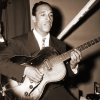
One of the finest and most rewarding box sets to cross my desk this year is The Enchanting Guitar of Oscar Moore: The 1945-1965 Years. Released by Fresh Sound, this three-CD set with terrific liner notes by Jordi Pujol is both captivating and illuminating.
Best known as the guitarist in the famed Nat King Cole Trio from 1938 to late 1947, Moore kept solid rhythm for the group with brief solo flourishes. In 1947, Moore joined his brother's group, Johnny More's Three Blazers. Johnny was a guitarist as well, but more in the R&B camp and would wind up influencing Chuck Berry. In the mid-1950s, Oscar Moore became a small-group leader and a sideman, and left the music business at decade's end.
On the new box's first CD, Moore is showcased in the Nat King Cole Trio and in a range of R&B groups, including Johnny Moore and His Blazers and with Ray Charles, Illinois Jacquet and vocalist Kitty White. On the second and third CDs, his playing becomes increasingly modern as he leads a duo, trio and quartet.
For too long, Moore has been thought of solely as a swing-era pop player in Nat King Cole's Trio and not much else. He's also been misjudged as a rhythm player with infrequent solos. This box shows how Moore's style evolved, initially inspired by Django Reinhardt and Charlie Christian before moving on to a confident coolness closer to Barney Kessel.
Among the treats on the second CD, we get to hear Ernie Freeman on piano on 11 tracks; Carl Perkins on piano, Joe Comfort on bass and Lee Young on drums; nine duo tracks with bassist Leroy Vinnegar; and 12 tracks with Gerald Wiggins on piano. And if this isn't enough, there are vocals tracks with Anita O'Day, George Bledsoe (a bassist), Kitty White and Dru Pegee.
This box is fat with astonishing guitar talent. Moore was one of the first to have a signature sound, dragging notes to make his guitar meow or gulp for emphasis. Moore also was clearly an influence on guitarist Ray Crawford, a mainstay in Ahmad Jamal earliest trio, and surely rubbed off on guitarists Wes Montgomery and Tal Farlow, among others. What's more, Moore's technique was so soulful and fleet and flawless that he was a favorite of Art Tatum.
Oscar Moore returned to recording in 1965 for a tribute album to the late Nat King Cole and briefly in the 1970s backing Helen Humes. He died in 1981 at age 64.
Bonus: Here's the Nat King Cole Trio with Cole at the piano, Moore on Guitar and Johnny Miller on bass playing Better to Be by Yourself in the mid-1940s...
And here are a bunch of Moore film solos...
Best known as the guitarist in the famed Nat King Cole Trio from 1938 to late 1947, Moore kept solid rhythm for the group with brief solo flourishes. In 1947, Moore joined his brother's group, Johnny More's Three Blazers. Johnny was a guitarist as well, but more in the R&B camp and would wind up influencing Chuck Berry. In the mid-1950s, Oscar Moore became a small-group leader and a sideman, and left the music business at decade's end.
On the new box's first CD, Moore is showcased in the Nat King Cole Trio and in a range of R&B groups, including Johnny Moore and His Blazers and with Ray Charles, Illinois Jacquet and vocalist Kitty White. On the second and third CDs, his playing becomes increasingly modern as he leads a duo, trio and quartet.
For too long, Moore has been thought of solely as a swing-era pop player in Nat King Cole's Trio and not much else. He's also been misjudged as a rhythm player with infrequent solos. This box shows how Moore's style evolved, initially inspired by Django Reinhardt and Charlie Christian before moving on to a confident coolness closer to Barney Kessel.
Among the treats on the second CD, we get to hear Ernie Freeman on piano on 11 tracks; Carl Perkins on piano, Joe Comfort on bass and Lee Young on drums; nine duo tracks with bassist Leroy Vinnegar; and 12 tracks with Gerald Wiggins on piano. And if this isn't enough, there are vocals tracks with Anita O'Day, George Bledsoe (a bassist), Kitty White and Dru Pegee.
This box is fat with astonishing guitar talent. Moore was one of the first to have a signature sound, dragging notes to make his guitar meow or gulp for emphasis. Moore also was clearly an influence on guitarist Ray Crawford, a mainstay in Ahmad Jamal earliest trio, and surely rubbed off on guitarists Wes Montgomery and Tal Farlow, among others. What's more, Moore's technique was so soulful and fleet and flawless that he was a favorite of Art Tatum.
Oscar Moore returned to recording in 1965 for a tribute album to the late Nat King Cole and briefly in the 1970s backing Helen Humes. He died in 1981 at age 64.
Bonus: Here's the Nat King Cole Trio with Cole at the piano, Moore on Guitar and Johnny Miller on bass playing Better to Be by Yourself in the mid-1940s...
And here are a bunch of Moore film solos...
This story appears courtesy of JazzWax by Marc Myers.
Copyright © 2026. All rights reserved.



























